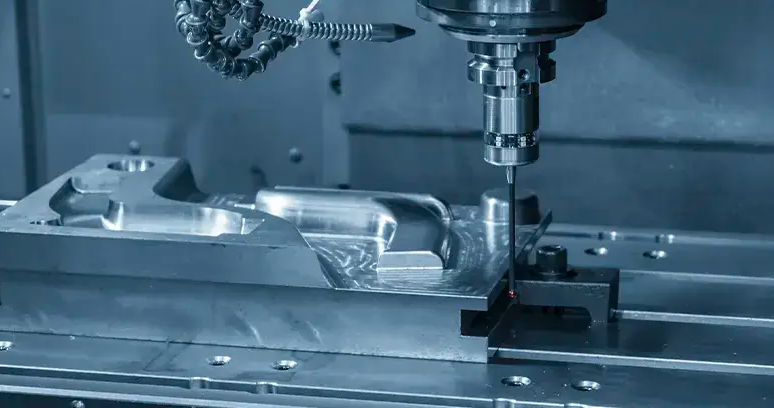CNC Milling Service: Precision Machining for Modern Manufacturing

CNC milling is a vital process in modern manufacturing, enabling the creation of precise and complex components with high efficiency. A CNC milling service provides businesses with the ability to produce parts quickly, accurately, and consistently. From prototyping to mass production, CNC milling is widely used across industries such as aerospace, automotive, medical, and electronics.
This article explores CNC milling services, their process, benefits, applications, materials used, and factors to consider when choosing a CNC milling provider.
Understanding CNC Milling
CNC milling is a subtractive manufacturing process where a rotating cutting tool removes material from a solid workpiece. Unlike traditional machining, CNC (Computer Numerical Control) milling is automated and controlled by a computer, ensuring high precision and repeatability.
The CNC milling service allows for the production of intricate shapes, detailed designs, and high-tolerance components, making it a preferred choice for industries requiring complex geometries.
How CNC Milling Works
The CNC milling process involves several steps to transform raw materials into finished parts.
1. Designing the CAD Model
Every project begins with a Computer-Aided Design (CAD) model. Engineers create a 3D digital blueprint of the part, specifying dimensions, features, and tolerances.
2. Generating CNC Programming
The CAD model is converted into G-code, which serves as instructions for the CNC milling machine. This code directs the machine’s movements, cutting speeds, tool changes, and material removal paths.
3. Material Selection and Setup
The appropriate material is selected and securely fixed onto the milling machine’s worktable. A cutting tool is then chosen based on the material type and required finish.
4. Milling Process Execution
The CNC machine operates according to the programmed G-code, removing material layer by layer to achieve the desired shape. Different milling techniques are used depending on the complexity of the part, including:
- Face Milling: Creates flat surfaces
- Contour Milling: Produces curved and contoured shapes
- Slot Milling: Cuts grooves and slots
- Drilling and Tapping: Forms holes and threads
5. Quality Inspection and Finishing
After machining, the parts undergo inspection using precision measurement tools to verify accuracy. If needed, additional finishing processes such as polishing, coating, or anodizing are applied.
Advantages of CNC Milling Services
CNC milling offers numerous benefits that make it a preferred choice for manufacturers worldwide.
1. High Precision and Accuracy
CNC milling machines can achieve tight tolerances, ensuring that parts meet exact specifications. This level of precision is critical in industries like aerospace and medical devices.
2. Efficient and Scalable Production
Once programmed, CNC milling machines can run continuously and efficiently, producing large quantities of parts without human intervention. This scalability is essential for mass production and rapid prototyping.
3. Versatility in Materials
A CNC milling service can work with a wide range of materials, including metals, plastics, and composites, making it suitable for diverse industries.
4. Complex Geometries and Customization
With multi-axis CNC milling, intricate designs and custom parts can be manufactured, enabling the creation of detailed and functional components.
5. Cost-Effective Production
While the initial setup costs may be high, CNC milling reduces waste, labor costs, and production errors, making it a cost-effective solution for both low and high-volume manufacturing.
6. Reduced Human Error
Automation ensures that every part is machined identically, eliminating variations and errors associated with manual machining.
Read also: Top Business Coaching Tips for Entrepreneurs
Common Materials Used in CNC Milling
CNC milling services work with a variety of materials, depending on the intended application and required properties.
1. Metals
- Aluminum: Lightweight, corrosion-resistant, and widely used in aerospace and automotive industries
- Stainless Steel: Strong, durable, and ideal for medical, industrial, and marine applications
- Brass: Excellent machinability and electrical conductivity, used in connectors and fittings
- Titanium: High strength-to-weight ratio, commonly found in medical implants and aerospace components
2. Plastics
- ABS: Durable and impact-resistant, commonly used in prototypes and consumer products
- Nylon: Strong and wear-resistant, often used in mechanical and industrial applications
- PTFE (Teflon): Chemical-resistant and non-stick, used in medical and food processing industries
- PEEK: Heat-resistant and biocompatible, preferred for aerospace and medical parts
Industries That Rely on CNC Milling Services
1. Aerospace Industry
CNC milling is essential in producing aircraft components, turbine blades, and structural parts that require high precision and strength.
2. Automotive Sector
Manufacturers rely on CNC milling for engine parts, transmission components, and braking systems, ensuring safety and performance.
3. Medical Device Manufacturing
Surgical tools, orthopedic implants, and prosthetic devices demand tight tolerances and biocompatibility, making CNC milling a crucial process.
4. Electronics and Robotics
From heat sinks to circuit board enclosures, CNC milling is used to create complex parts with fine details for electronic devices.
5. Industrial Machinery
Custom gears, housings, and machine components benefit from the precision and durability of CNC-milled parts.
Choosing the Right CNC Milling Service Provider
Finding a reliable CNC milling service is critical to ensuring high-quality parts and smooth production. Consider the following factors when selecting a provider:
1. Experience and Expertise
A reputable provider should have years of experience in CNC milling and a track record of successful projects.
2. Advanced Machinery and Technology
Ensure the provider uses state-of-the-art CNC milling machines capable of handling complex designs and various materials.
3. Material Selection and Capabilities
The best CNC milling services offer a wide range of materials and can provide guidance on selecting the most suitable one for your project.
4. Quality Control Measures
Look for companies with ISO certifications and stringent quality control processes to guarantee accurate and defect-free parts.
5. Customization and Flexibility
A reliable service should offer custom milling options, allowing for modifications, prototyping, and unique designs.
6. Competitive Pricing and Fast Turnaround
Compare quotes and lead times to find a provider that offers cost-effective solutions without compromising quality.
Future Trends in CNC Milling
The CNC milling industry is continuously evolving with advancements in automation, AI, and sustainable manufacturing.
1. AI and Machine Learning Integration
Modern CNC machines are incorporating AI-powered monitoring systems to improve precision, detect errors, and optimize tool paths.
2. Hybrid Manufacturing
The combination of CNC milling and additive manufacturing (3D printing) allows for the creation of more complex and lightweight components.
3. Smart Factories and IoT
With Industrial IoT (IIoT), CNC milling machines can be connected to cloud-based monitoring systems, improving efficiency and predictive maintenance.
4. Sustainable Manufacturing
Manufacturers are adopting eco-friendly machining techniques, using recyclable materials and energy-efficient CNC machines to reduce waste.
Conclusion
A CNC milling service is essential for industries requiring precision, efficiency, and scalability in manufacturing. Whether for prototyping or mass production, CNC milling provides a reliable solution for creating high-quality components across various sectors.
By choosing a reputable CNC milling provider, businesses can ensure superior craftsmanship, cost-effective production, and timely delivery, helping them stay competitive in an evolving marketplace. As technology advances, CNC milling will continue to shape the future of modern manufacturing with greater automation, accuracy, and sustainability.







